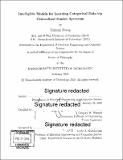Intelligible models for learning categorical data via generalized fourier spectrum
Author(s)
Zhang, Xuhong,Ph. D.Massachusetts Institute of Technology.
Download1102048968-MIT.pdf (15.35Mb)
Other Contributors
Massachusetts Institute of Technology. Department of Electrical Engineering and Computer Science.
Advisor
Gregory W. Wornell.
Terms of use
Metadata
Show full item recordAbstract
Machine learning techniques have found ubiquitous applications in recent years and sophisticated models such as neural networks and ensemble methods have achieved impressive predictive performances. However, these models are hard to interpret and usually used as a blackbox. In applications where an explanation is required in addition to a prediction, linear models (e.g. Linear Regression or Logistic Regression) remain to be mainstream tools due to their simplicity and good interpretability. This thesis considers learning problems on categorical data and proposes methods that retain the good interpretability of linear models but significantly improve the predictive performance. In particular, we provide ways to automatically generate and efficiently select new features based on the raw data, and then train a linear model in the new feature space. The proposed methods are inspired by the Boolean function analysis literature, which studies the Fourier spectrum of Boolean functions and in turn provides spectrum-based learning algorithms. Such algorithms are important tools in computational learning theory, but not considered practically useful due to the unrealistic assumption of uniform input distribution. This work generalizes the idea of Fourier spectrum of Boolean functions to allow arbitrary input distribution. The generalized Fourier spectrum is also of theoretical interest. It carries over and meaningfully generalizes many important results of Fourier spectrum. Moreover, it offers a framework to explore how the input distribution and target function jointly affect the difficulty of a learning problem, and provides the right language for discussing data-dependent, algorithm-independent complexity of Boolean functions.
Description
Thesis: Ph. D., Massachusetts Institute of Technology, Department of Electrical Engineering and Computer Science, 2019 Cataloged from PDF version of thesis. Includes bibliographical references (pages 167-170).
Date issued
2019Department
Massachusetts Institute of Technology. Department of Electrical Engineering and Computer SciencePublisher
Massachusetts Institute of Technology
Keywords
Electrical Engineering and Computer Science.